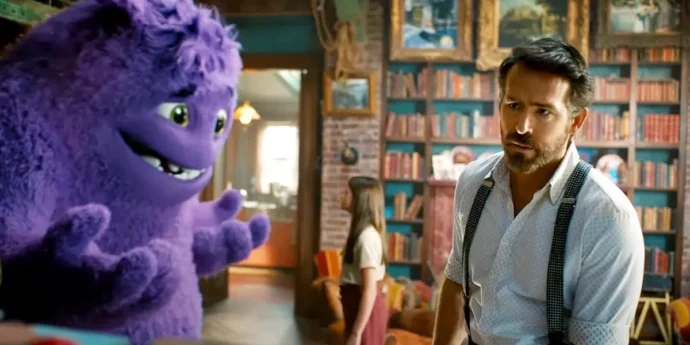
John Krasinski has followed in the footsteps of Ron Howard and Penny Marshall before him, going from sitcom success to movie directing. His latest, the Pixar-esque kids feature IF, may seem like a departure from his previous ventures. The Quiet Place guy making a kids movie seems ludicrous. However, despite their scares, those horror hits focus on family drama and kids finding their way in a confusing world. The blueprint is there, and Krasinski’s success with Paramount has allowed him to make something to inspire children and the parents who left childhood behind. Or at least, that’s his goal.
Krasinski has a passion and drive to make something great here. Make a film that isn’t loud noises or wacky shenanigans. Have a film that tries to offer something insightful and work across all age levels. Give a call for audiences to hold onto their inner child, and remember to keep their innocence and hope and imagination alive. In some regards, it’s easy to respect this film’s ideology. Especially when you’re like me and had to endure trailers for junk food like Despicable Me 4 and Transformers One. However, as is common for films with this message, the whole film rings as hollow and empty. If Steven Spielberg couldn’t succeed with this theme in Hook, why would Jim Halpert do it?
In all regards, the biggest problem this film faces comes down to the “why” of it all. The premise is an appealing one, following the Pixar “what if” formula. As well as, granted, a highly successful Cartoon Network series also about imaginary friends. This is a movie about a little girl, Cailey Fleming’s Bea, who can see imaginary friends. She meets another person who can see imaginary friends (they call themselves IFs, because of course they do), played by Ryan Reynolds. The two are tasked with helping these IFs, now abandoned by their grown-up children, find new kids to play with.
A sound concept for a kids title, yet it’s all ruined by the film’s meandering pace and aimlessness. There’s a lot of things that don’t really add up right away. Why do only these two human characters see these IFs? How does an already existing IF get paired up with another kid? How do they come to be? That admittedly I can wave off as nitpicking. Toy Story doesn’t make a lot of sense, yet it endures as an all-time classic.
However, the drive for why these IFs need to be paired with new kids and find some sort of purpose? Well, there’s no real stakes, as nothing bad really happens if these IFs don’t find a kid. They don’t disappear into nothingness, nor do they lose their identity or memories. In fact, we visit an IF retirement home midway through the film. And these goofy creatures largely enjoy doing whatever they want in this home, performing in concerts, enjoying recreational activities, living in luxury. They seem happy not having any kids to play with, so the whole “we need these IFs to have kids” conflict doesn’t matter.
Because this movie has no stakes or a reason to care, this just results in a film that meanders from scene to scene, with little action or drama, and surprisingly little humor despite the massive voice cast of comedy favorites. This is anchored by Ryan Reynolds’ Cal, a casting decision that frankly ruins the whole piece. Playing the PG version of his usual cynical and snarky persona, it creates even more clashing tones. The film desperately pushes itself as a feat of whimsy and wonder, from the candy-colored IFs to the abrasive Michael Giacchino score. Krasinski even got Janusz Kaminski, the man who shoots all of Spielberg’s movies, to do the cinematography.
But Reynolds portrays Cal so miserable and bored and unenthused that it seeps into the audience. Granted, the actual attempts to be whimsical are schmaltzy and manipulative. Especially when Krasinski, playing Bea’s eccentric and charming father (well, he attempts to be those things), is in frame. However, Cal starts the film frustrated and annoyed by all the antics and idiosyncrasies of these CG creatures, and never really grows from that mindset. And that bitterness makes the audience bored in the process. We empathize with how annoyed he is. We are also unamused by the fantastical world and characters. If the characters are uninvested, why would the audience?
And it’s these clashing characters and tones, the forced whimsy and bitter frustration, that really creates the film’s biggest problem. Who would this appeal to? This film is too slow and meandering for kids, with the wacky comedy promised in the trailers not very prominent in the final product. It’s too cutesy and cloying for adults, as its themes of innocence and creativity are too preachy and underdeveloped. It might have a nice message, but there are plenty other kidpics, including the Pixar titles this took inspiration from, that tackle these ideas with a lot more intrigue, a lot more urgency, and a lot more personality. Ultimately, for a film all about imagination, you can’t really say the film has much of that.